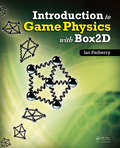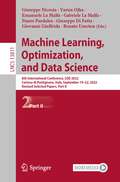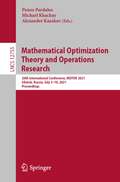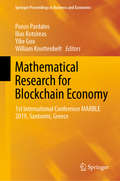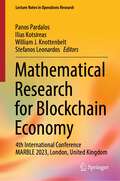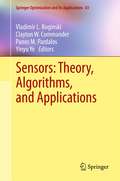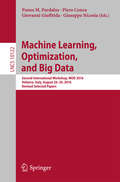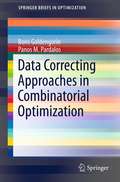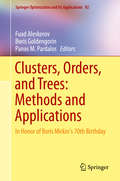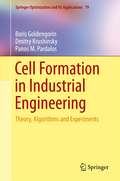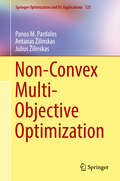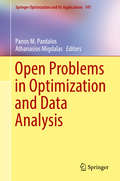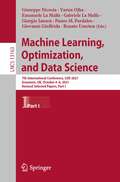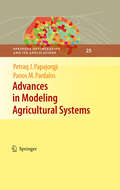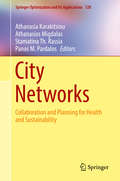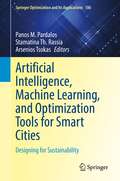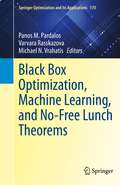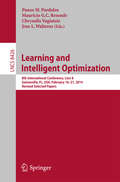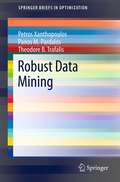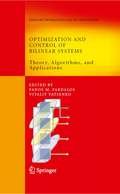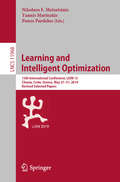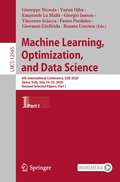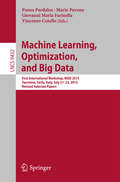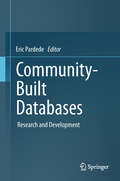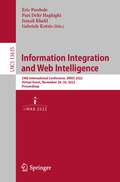- Table View
- List View
Introduction to Game Physics with Box2D
by Ian ParberryWritten by a pioneer of game development in academia, Introduction to Game Physics with Box2D covers the theory and practice of 2D game physics in a relaxed and entertaining yet instructional style. It offers a cohesive treatment of the topics and code involved in programming the physics for 2D video games. Focusing on writing elementary game physics code, the first half of the book helps you grasp the challenges of programming game physics from scratch, without libraries or outside help. It examines the mathematical foundation of game physics and illustrates how it is applied in practice through coding examples. The second half of the book shows you how to use Box2D, a popular open source 2D game physics engine. A companion website provides supplementary material, including source code and videos. This book helps you become a capable 2D game physics programmer through its presentation of both the theory and applications of 2D game physics. After reading the book and experimenting with the code samples, you will understand the basics of 2D game physics and know how to use Box2D to make a 2D physics-based game.
Machine Learning, Optimization, and Data Science: 8th International Workshop, LOD 2022, Certosa di Pontignano, Italy, September 19–22, 2022, Revised Selected Papers, Part II (Lecture Notes in Computer Science #13811)
by Panos Pardalos Giuseppe Di Fatta Giuseppe Nicosia Giovanni Giuffrida Renato Umeton Varun Ojha Emanuele La Malfa Gabriele La MalfaThis two-volume set, LNCS 13810 and 13811, constitutes the refereed proceedings of the 8th International Conference on Machine Learning, Optimization, and Data Science, LOD 2022, together with the papers of the Second Symposium on Artificial Intelligence and Neuroscience, ACAIN 2022. The total of 84 full papers presented in this two-volume post-conference proceedings set was carefully reviewed and selected from 226 submissions. These research articles were written by leading scientists in the fields of machine learning, artificial intelligence, reinforcement learning, computational optimization, neuroscience, and data science presenting a substantial array of ideas, technologies, algorithms, methods, and applications.
Mathematical Optimization Theory and Operations Research: 20th International Conference, MOTOR 2021, Irkutsk, Russia, July 5–10, 2021, Proceedings (Lecture Notes in Computer Science #12755)
by Panos Pardalos Michael Khachay Alexander KazakovThis book constitutes the proceedings of the 20th International Conference on Mathematical Optimization Theory and Operations Research, MOTOR 2021, held in Irkutsk, Russia, in July 2021. The 29 full papers and 1 short paper presented in this volume were carefully reviewed and selected from 102 submissions. Additionally, 2 full invited papers are presented in the volume. The papers are grouped in the following topical sections: combinatorial optimization; mathematical programming; bilevel optimization; scheduling problems; game theory and optimal control; operational research and mathematical economics; data analysis.
Mathematical Research for Blockchain Economy: 1st International Conference MARBLE 2019, Santorini, Greece (Springer Proceedings in Business and Economics)
by Panos Pardalos Ilias Kotsireas William Knottenbelt Yike GuoThis book presents the best papers from the 1st International Conference on Mathematical Research for Blockchain Economy (MARBLE) 2019, held in Santorini, Greece. While most blockchain conferences and forums are dedicated to business applications, product development or Initial Coin Offering (ICO) launches, this conference focused on the mathematics behind blockchain to bridge the gap between practice and theory. Every year, thousands of blockchain projects are launched and circulated in the market, and there is a tremendous wealth of blockchain applications, from finance to healthcare, education, media, logistics and more. However, due to theoretical and technical barriers, most of these applications are impractical for use in a real-world business context. The papers in this book reveal the challenges and limitations, such as scalability, latency, privacy and security, and showcase solutions and developments to overcome them.
Mathematical Research for Blockchain Economy: 4th International Conference MARBLE 2023, London, United Kingdom (Lecture Notes in Operations Research)
by Panos Pardalos Ilias Kotsireas William J. Knottenbelt Stefanos LeonardosThis book presents the best papers from the 4th International Conference on Mathematical Research for Blockchain Economy (MARBLE) 2023, held in London, UK. While most blockchain conferences and forums are dedicated to business applications, product development, or Initial Coin Offering (ICO) launches, this conference focused on the mathematics behind blockchain to bridge the gap between practice and theory. The book spans the divide between theoretical promise and practical reality in blockchain technology and explores the challenges hindering its real-world integration across diverse sectors, offering comprehensive insights into issues like scalability, security, and privacy.
Sensors: Theory, Algorithms, and Applications (Springer Optimization and Its Applications #61)
by Panos M. Pardalos Vladimir L. Boginski Yinyu Ye Clayton W. CommanderThe objective of this book is to advance the current knowledge of sensor research particularly highlighting recent advances, current work, and future needs. The goal is to share current technologies and steer future efforts in directions that will benefit the majority of researchers and practitioners working in this broad field of study.
Machine Learning, Optimization, and Big Data
by Panos M. Pardalos Piero Conca Giovanni Giuffrida Giuseppe NicosiaThis book constitutes revised selected papers from the Second International Workshop on Machine Learning, Optimization, and Big Data, MOD 2016, held in Volterra, Italy, in August 2016. The 40 papers presented in this volume were carefully reviewed and selected from 97 submissions. These proceedings contain papers in the fields of Machine Learning, Computational Optimization and DataScience presenting a substantial array of ideas, technologies, algorithms, methods and applications.
Data Correcting Approaches in Combinatorial Optimization (SpringerBriefs in Optimization)
by Panos M. Pardalos Boris GoldengorinData Correcting Approaches in Combinatorial Optimization focuses on algorithmic applications of the well known polynomially solvable special cases of computationally intractable problems. The purpose of this text is to design practically efficient algorithms for solving wide classes of combinatorial optimization problems. Researches, students and engineers will benefit from new bounds and branching rules in development efficient branch-and-bound type computational algorithms. This book examines applications for solving the Traveling Salesman Problem and its variations, Maximum Weight Independent Set Problem, Different Classes of Allocation and Cluster Analysis as well as some classes of Scheduling Problems. Data Correcting Algorithms in Combinatorial Optimization introduces the data correcting approach to algorithms which provide an answer to the following questions: how to construct a bound to the original intractable problem and find which element of the corrected instance one should branch such that the total size of search tree will be minimized. The PC time needed for solving intractable problems will be adjusted with the requirements for solving real world problems.
Clusters, Orders, and Trees: In Honor of Boris Mirkin's 70th Birthday (Springer Optimization and Its Applications #92)
by Panos M. Pardalos Boris Goldengorin Fuad AleskerovThe volume is dedicated to Boris Mirkin on the occasion of his 70th birthday. In addition to his startling PhD results in abstract automata theory, Mirkin's ground breaking contributions in various fields of decision making and data analysis have marked the fourth quarter of the 20th century and beyond Mirkin has done pioneering work in group choice, clustering, data mining and knowledge discovery aimed at finding and describing non-trivial or hidden structures--first of all, clusters, orderings and hierarchies--in multivariate and/or network data. This volume contains a collection of papers reflecting recent developments rooted in Mirkin's fundamental contribution to the state-of-the-art in group choice, ordering, clustering, data mining and knowledge discovery. Researchers, students and software engineers will benefit from new knowledge discovery techniques and application directions.
Cell Formation in Industrial Engineering: Theory, Algorithms and Experiments (Springer Optimization and Its Applications #79)
by Panos M. Pardalos Boris Goldengorin Dmitry KrushinskyThis book focuses on a development of optimal, flexible, and efficient models and algorithms for cell formation in group technology. Its main aim is to provide a reliable tool that can be used by managers and engineers to design manufacturing cells based on their own preferences and constraints imposed by a particular manufacturing system. This tool could potentially lower production costs by minimizing other costs in a number of areas, thereby increasing profit in a manufacturing system. In the volume, the cell formation problem is considered in a systematic and formalized way, and several models are proposed, both heuristic and exact. The models are based on general clustering problems, and are flexible enough to allow for various objectives and constraints. The authors also provide results of numerical experiments involving both artificial data from academic papers in the field and real manufacturing data to certify the appropriateness of the models proposed. The book was intended to suit the broadest possible audience, and thus all algorithmic details are given in a detailed description with multiple numerical examples and informal explanations are provided for the theoretical results. In addition to managers and industrial engineers, this book is intended for academic researchers and students. It will also be attractive to many theoreticians, since it addresses many open problems in computer science and bioinformatics.
Non-Convex Multi-Objective Optimization (Springer Optimization and Its Applications #123)
by Panos M. Pardalos Antanas Žilinskas Julius ŽilinskasRecent results on non-convex multi-objective optimization problems and methods are presented in this book, with particular attention to expensive black-box objective functions. Multi-objective optimization methods facilitate designers, engineers, and researchers to make decisions on appropriate trade-offs between various conflicting goals. A variety of deterministic and stochastic multi-objective optimization methods are developed in this book. Beginning with basic concepts and a review of non-convex single-objective optimization problems; this book moves on to cover multi-objective branch and bound algorithms, worst-case optimal algorithms (for Lipschitz functions and bi-objective problems), statistical models based algorithms, and probabilistic branch and bound approach. Detailed descriptions of new algorithms for non-convex multi-objective optimization, their theoretical substantiation, and examples for practical applications to the cell formation problem in manufacturing engineering, the process design in chemical engineering, and business process management are included to aide researchers and graduate students in mathematics, computer science, engineering, economics, and business management.
Open Problems in Optimization and Data Analysis (Springer Optimization and Its Applications #141)
by Panos M. Pardalos Athanasios MigdalasComputational and theoretical open problems in optimization, computational geometry, data science, logistics, statistics, supply chain modeling, and data analysis are examined in this book. Each contribution provides the fundamentals needed to fully comprehend the impact of individual problems. Current theoretical, algorithmic, and practical methods used to circumvent each problem are provided to stimulate a new effort towards innovative and efficient solutions. Aimed towards graduate students and researchers in mathematics, optimization, operations research, quantitative logistics, data analysis, and statistics, this book provides a broad comprehensive approach to understanding the significance of specific challenging or open problems within each discipline. The contributions contained in this book are based on lectures focused on “Challenges and Open Problems in Optimization and Data Science” presented at the Deucalion Summer Institute for Advanced Studies in Optimization, Mathematics, and Data Science in August 2016.
Machine Learning, Optimization, and Data Science: 7th International Conference, LOD 2021, Grasmere, UK, October 4–8, 2021, Revised Selected Papers, Part I (Lecture Notes in Computer Science #13163)
by Panos M. Pardalos Giuseppe Nicosia Giovanni Giuffrida Renato Umeton Varun Ojha Emanuele La Malfa Giorgio Jansen Gabriele La MalfaThis two-volume set, LNCS 13163-13164, constitutes the refereed proceedings of the 7th International Conference on Machine Learning, Optimization, and Data Science, LOD 2021, together with the first edition of the Symposium on Artificial Intelligence and Neuroscience, ACAIN 2021.The total of 86 full papers presented in this two-volume post-conference proceedings set was carefully reviewed and selected from 215 submissions. These research articles were written by leading scientists in the fields of machine learning, artificial intelligence, reinforcement learning, computational optimization, neuroscience, and data science presenting a substantial array of ideas, technologies, algorithms, methods, and applications.
Advances in Modeling Agricultural Systems (Springer Optimization and Its Applications #25)
by Panos M. Pardalos Petraq PapajorgjiThis book presents an up-to-date review of advances in the mathematical modeling of agricultural systems. It covers a broad spectrum of problems and applications based on internet and communications technology, as well as methodological approaches based on the integration of different simulation and data management tools. Using real-world cases, each chapter presents a detailed solution of a problem in a particular field. This book demonstrates that regardless of the nature of the problem and the application domain, modeling is a central and important activity in the process of developing agricultural systems. Researchers and graduate students in the fields of agriculture and environmental studies will benefit from this book. It will also serve as an excellent reference for managers, team leaders, developers and modelers of agricultural and environmental systems and researchers in the applied computation field.
City Networks: Collaboration and Planning for Health and Sustainability (Springer Optimization and Its Applications #128)
by Panos M. Pardalos Stamatina Th. Rassia Athanasia Karakitsiou Athanasios MigdalasThis book both analyzes and synthesizes new cutting-edge theories and methods for future design implementations in smart cities through interdisciplinary synergizing of architecture, technology, and the Internet of Things (IoT). Implementation of IoT enables the collection and data exchange of objects embedded with electronics, software, sensors, and network connectivity. Recently IoT practices have moved into uniquely identifiable objects that are able to transfer data directly into networks. This book features new technologically advanced ideas, highlighting properties of smart future city networks. Chapter contributors include theorists, computer scientists, mathematicians, and interdisciplinary planners, who currently work on identifying theories, essential elements, and practices where the IoT can impact the formation of smart cities and sustainability via optimization, network analyses, data mining, mathematical modeling and engineering. Moreover, this book includes research-based theories and real world practices aimed toward graduate researchers, experts, practitioners and the general public interested in architecture, engineering, mathematical modeling, industrial design, computer science technologies, and related fields.
Artificial Intelligence, Machine Learning, and Optimization Tools for Smart Cities: Designing for Sustainability (Springer Optimization and Its Applications #186)
by Panos M. Pardalos Stamatina Th. Rassia Arsenios TsokasThis volume offers a wealth of interdisciplinary approaches to artificial intelligence, machine learning and optimization tools, which contribute to the optimization of urban features towards forming smart, sustainable, and livable future cities.Special features include:New research on the design of city elements and smart systems with respect to new technologies and scientific thinkingDiscussions on the theoretical background that lead to smart cities for the futureNew technologies and principles of research that can promote ideas of artificial intelligence and machine learning in optimized urban environmentsThe book engages students and researchers in the subjects of artificial intelligence, machine learning, and optimization tools in smart sustainable cities as eminent international experts contribute their research results and thinking in its chapters. Overall, its audience can benefit from a variety of disciplines including, architecture, engineering, physics, mathematics, computer science, and related fields.
Black Box Optimization, Machine Learning, and No-Free Lunch Theorems (Springer Optimization and Its Applications #170)
by Panos M. Pardalos Varvara Rasskazova Michael N. VrahatisThis edited volume illustrates the connections between machine learning techniques, black box optimization, and no-free lunch theorems. Each of the thirteen contributions focuses on the commonality and interdisciplinary concepts as well as the fundamentals needed to fully comprehend the impact of individual applications and problems. Current theoretical, algorithmic, and practical methods used are provided to stimulate a new effort towards innovative and efficient solutions. The book is intended for beginners who wish to achieve a broad overview of optimization methods and also for more experienced researchers as well as researchers in mathematics, optimization, operations research, quantitative logistics, data analysis, and statistics, who will benefit from access to a quick reference to key topics and methods. The coverage ranges from mathematically rigorous methods to heuristic and evolutionary approaches in an attempt to equip the reader with different viewpoints of the same problem.
Learning and Intelligent Optimization
by Panos M. Pardalos Mauricio G. C. Resende Chrysafis Vogiatzis Jose L. WalterosThis book constitutes the thoroughly refereed post-conference proceedings of the 8th International Conference on Learning and Optimization, LION 8, which was held in Gainesville, FL, USA, in February 2014. The 33 contributions presented were carefully reviewed and selected for inclusion in this book. A large variety of topics are covered, such as algorithm configuration; multiobjective optimization; metaheuristics; graphs and networks; logistics and transportation; and biomedical applications.
Robust Data Mining
by Panos M. Pardalos Theodore B. Trafalis Petros XanthopoulosData uncertainty is a concept closely related with most real life applications that involve data collection and interpretation. Examples can be found in data acquired with biomedical instruments or other experimental techniques. Integration of robust optimization in the existing data mining techniques aim to create new algorithms resilient to error and noise. This work encapsulates all the latest applications of robust optimization in data mining. This brief contains an overview of the rapidly growing field of robust data mining research field and presents the most well known machine learning algorithms, their robust counterpart formulations and algorithms for attacking these problems. This brief will appeal to theoreticians and data miners working in this field.
Optimization and Control of Bilinear Systems
by Panos M. Pardalos Vitaliy A. YatsenkoCovers developments in bilinear systems theory Focuses on the control of open physical processes functioning in a non-equilibrium mode Emphasis is on three primary disciplines: modern differential geometry, control of dynamical systems, and optimization theory Includes applications to the fields of quantum and molecular computing, control of physical processes, biophysics, superconducting magnetism, and physical information science
Learning and Intelligent Optimization: 13th International Conference, LION 13, Chania, Crete, Greece, May 27–31, 2019, Revised Selected Papers (Lecture Notes in Computer Science #11968)
by Panos Pardalos Nikolaos F. Matsatsinis Yannis MarinakisThis book constitutes the thoroughly refereed pChania, Crete, Greece, in May 2019. The 38 full papers presented have been carefully reviewed and selected from 52 submissions. The papers focus on advancedresearch developments in such interconnected fields as mathematical programming, global optimization, machine learning, and artificial intelligence and describe advanced ideas, technologies, methods, and applications in optimization and machine learning.
Machine Learning, Optimization, and Data Science: 6th International Conference, LOD 2020, Siena, Italy, July 19–23, 2020, Revised Selected Papers, Part I (Lecture Notes in Computer Science #12565)
by Panos Pardalos Giuseppe Nicosia Giovanni Giuffrida Renato Umeton Vincenzo Sciacca Varun Ojha Emanuele La Malfa Giorgio JansenThis two-volume set, LNCS 12565 and 12566, constitutes the refereed proceedings of the 6th International Conference on Machine Learning, Optimization, and Data Science, LOD 2020, held in Siena, Italy, in July 2020.The total of 116 full papers presented in this two-volume post-conference proceedings set was carefully reviewed and selected from 209 submissions. These research articles were written by leading scientists in the fields of machine learning, artificial intelligence, reinforcement learning, computational optimization, and data science presenting a substantial array of ideas, technologies, algorithms, methods, and applications.
Machine Learning, Optimization, and Big Data
by Panos Pardalos Mario Pavone Giovanni Maria Farinella Vincenzo CutelloThis bookconstitutes revised selected papers from the First International Workshop onMachine Learning, Optimization, and Big Data, MOD 2015, held in Taormina, Sicily,Italy, in July 2015. The 32papers presented in this volume were carefully reviewed and selected from 73submissions. They deal with the algorithms, methods and theories relevant indata science, optimization and machine learning.
Community-Built Databases: Research and Development
by Eric PardedeWikipedia, Flickr, You Tube, Facebook, LinkedIn are all examples of large community-built databases, although with quite diverse purposes and collaboration patterns. Their usage and dissemination will further grow introducing e.g. new semantics, personalization, or interactive media. Pardede delivers the first comprehensive research reference on community-built databases. The contributions discuss various technical and social aspects of research in and development in areas like in Web science, social networks, and collaborative information systems. Pardede delivers the first comprehensive research reference on community-built databases. The contributions discuss various technical and social aspects of research in and development in areas like in Web science, social networks, and collaborative information systems.
Information Integration and Web Intelligence: 24th International Conference, iiWAS 2022, Virtual Event, November 28–30, 2022, Proceedings (Lecture Notes in Computer Science #13635)
by Eric Pardede Pari Delir Haghighi Ismail Khalil Gabriele KotsisThis volume includes the papers presented at the 24th International Conference on Information Integration and Web Intelligence (iiWAS 2022), organized in conjunction with 24th International Conference on Advances in Mobile Computing & Multimedia Intelligence (MoMM2022).The dominant research focus of submitted papers was artificial intelligence and machine learning. The accepted papers presented advances and innovations in an array of areas such as internet of things, virtual and augmented reality, various business applications. iiWAS 2022 attracted 97 papers, from which the Program Committee selected 26 regular papers and 25 short papers.Due to safety concerns as well as other restrictions preventing travel and gatherings, it was decided to organize iiWAS 2022 as a virtual conference.
